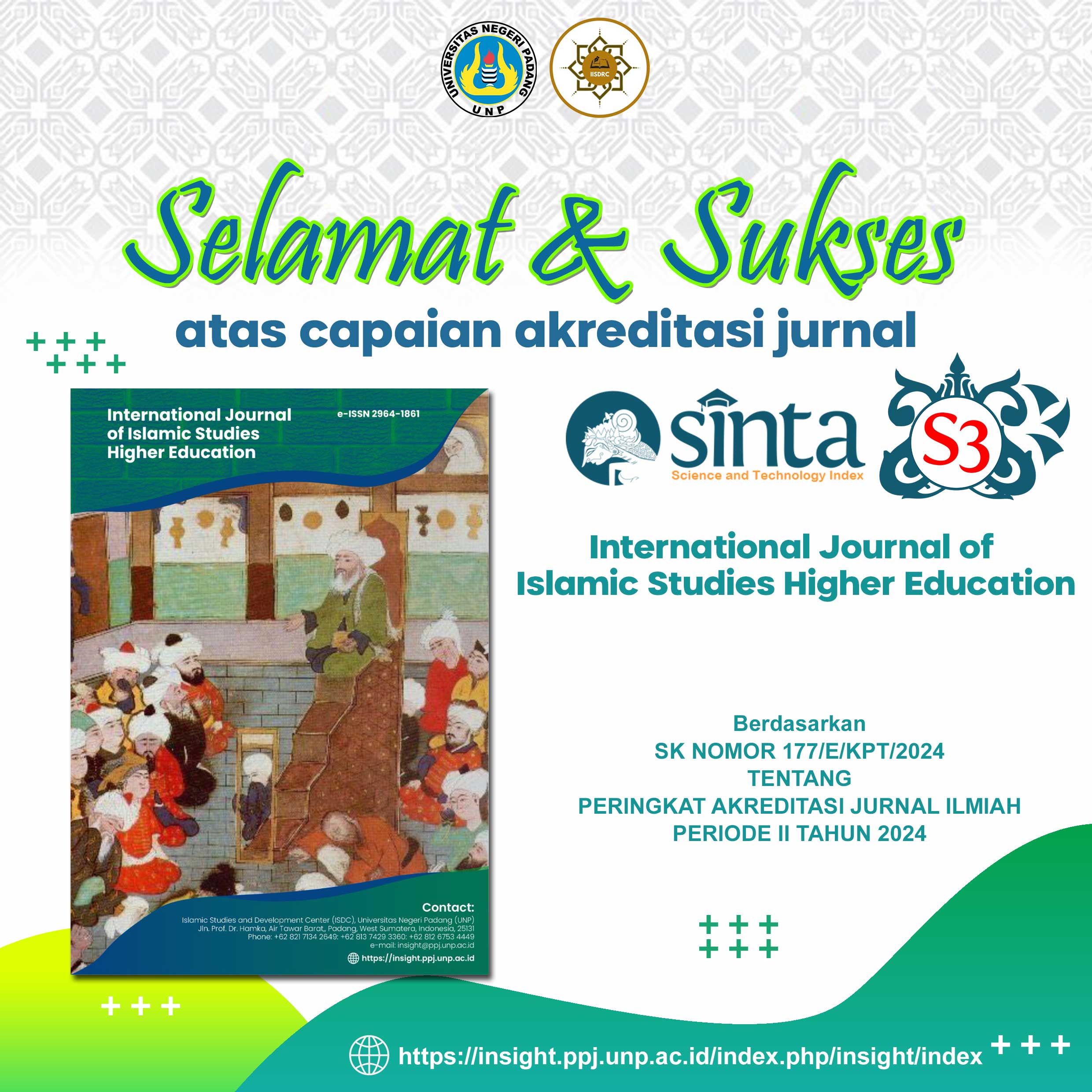The Relationship Between Prophetic Hadith and Intellect: A Critical Examination of the Scholarly Discourse
DOI:
https://doi.org/10.24036/insight.v2i2.130Keywords:
Prophetic hadith, weakness, intellect, authentication, muslim scholarsAbstract
If the authenticity of a Hadith is uncertain and contradicts intellect, it can be deemed weak. However, if a Hadith is deemed authentic by Hadith scholars, two distinct theories emerge among Muslim scholars. The first theory argues that a correct Hadith never opposes the intellect. According to this perspective, a sound and clear intellect will never contradict an authentic Hadith. In contrast, the second theory posits that a prophetic Hadith should be considered weak if it conflicts with intellect. The study employs analytical and library research methods, drawing on a range of scholarly works including books, academic articles, and writings by Muslim scholars. The findings of this paper indicate that a Hadith, narrated through a strong chain of narrators tracing back to the Prophet, cannot inherently contradict the intellect. However, if a Hadith contradicts sound intellect, it can serve as a valid reason to question its authenticity and consider it weak. Through a comprehensive analysis of the scholarly discourse, this study provides a deeper understanding of the complex relationship between Hadith and intellect and how Islam values the intellect. It underscores the importance of rigorous authentication processes, emphasizing the need to consider the reliability of the Hadith chain and the principles of intellectual reasoning when assessing the strength or weakness of a prophetic Hadith.
References
Abou El Fadl, K. (2015). The epistemology of the truth in modern Islam. Philosophy & Social Criticism, 41(4–5), 473–486. https://doi.org/10.1177/0191453715577739
Aydin, N. (2020). Paradigmatic foundation and moral axioms of ihsan ethics in Islamic economics and business. Journal of Islamic Accounting and Business Research, 11(2), 288–308. https://doi.org/10.1108/JIABR-12-2016-0146
Azaddin, R. (2022). Majal al-’Aql fi al-Naqd al-Hadithi 'Ind al-Muhaddithin." Majallat al-Buhuth al-’Ilmiyyah wa al-Dirasat al-Islamiyyah (Vols. 14, Numéro, pp. 11–44). https://www.asjp.cerist.dz/en/downArticle/264/14/5/211315
Arifin, Z. (2018). Al-Ghazali’s Thought of Islamic Education And it’s Relevance with the Modern Education. Khalifa: Journal of Islamic Education, 2(1), 1. https://doi.org/10.24036/kjie.v2i1.18
Emad, A. S., & Mutalqa, A. (2013). Al-’alaqah bayn al-’aql wal-wahy wa an’akasatoha al-fikriyah wal-tarbawiyah. In , Majallat Al-Manarah lil-Buhuth wal-Dirasat (Vols. 20, 1, pp. 241–263). http://hdl.handle.net/123456789/311
Floridi, L., Cowls, J., Beltrametti, M., Chatila, R., Chazerand, P., Dignum, V., & Vayena, E. (2021). An ethical framework for a good AI society: Opportunities, risks, principles, and recommendations. Ethics, Governance, and Policies in Artificial Intelligence, 19–39. https://doi.org/https://doi.org/10.1007/978-3-030-81907-1_3
Gonibala, R. (2019). Manajemen Akal Dan Orientasi Studi Al-Quran Dan Al-Hadits. Jurnal Pendidikan Agama Islam, 3(2), 283–294. https://journal.iaingorontalo.ac.id/index.php/ah/article/view/2654%0Ahttps://journal.iaingorontalo.ac.id/index.php/ah/article/download/2654/1416
Haltinner, K., & Sarathchandra, D. (2021). The Nature and Nuance of Climate Change Skepticism in the United States. Rural Sociology, 86(4), 673–702. https://doi.org/10.1111/ruso.12371
Jafari, A. (2012). Islamic marketing: Insights from a critical perspective. Journal of Islamic Marketing, 3(1), 22–34. https://doi.org/10.1108/17590831211206563
Kamri, N. A., Ramlan, S., & Ibrahim, A. (2014). Qur’anic Work Ethics. Journal of Usuluddin, 40, 135–172. https://ssrn.com/abstract=2687422
Khaldun, I. (n.d.). ’Abd al-Rahman ibn Muhammad, Tarikh Ibn Khaldun. In Dar al-Akhirah. Published in 1401 AH, 1981 CE.
Mustafa, D., Baita, A. J., & Usman, A. Y. (2018). Impact Analysis of Islamic Finance on Financial Inclusion and Economic Growth in Selected Muslim Countries: Lessons for Nigeria. International Journal of Economics, Management and Accounting, 26(2), 393–414. https://journals.iium.edu.my/enmjournal/index.php/enmj/article/view/512
Padela, A. I., & Qureshi, O. (2019). Islamic Perspectives on Clinical Intervention Near the End of Life: We Can but Must We? Death and Dying: An Exercise in Comparative Philosophy of Religion, 201–225. https://doi.org/10.1007/978-3-030-19300-3_13
Saeed, A. (2020). The Role of Reason in Dealing with the Prophetic Sunna in Relation to the Chain of Narrators, Text and Indication. AlBayan, 18(1), 74–106. https://doi.org/10.1163/22321969-12340081
Safdar, M. A., Afzal, W., & Zahoor, R. (2022). Effect of Maqasid al-Shari'ah on Preservation of Wealth. Al-Qamar, 153–164. https://doi.org/10.53762/alqamar.05.01.e08
Toor, S. U. R., & Ofori, G. (2009). Ethical leadership: Examining the relationships with full range leadership model, employee outcomes, and organizational culture. Journal of Business Ethics, 90, 533–547. https://doi.org/https://doi.org/10.1007/s10551-009-0059-3
Downloads
Published
How to Cite
Issue
Section
License
Copyright (c) 2023 Habiburrahman Rizapoor, Aminullah Poya, Zaifullah Athari

This work is licensed under a Creative Commons Attribution-ShareAlike 4.0 International License.











